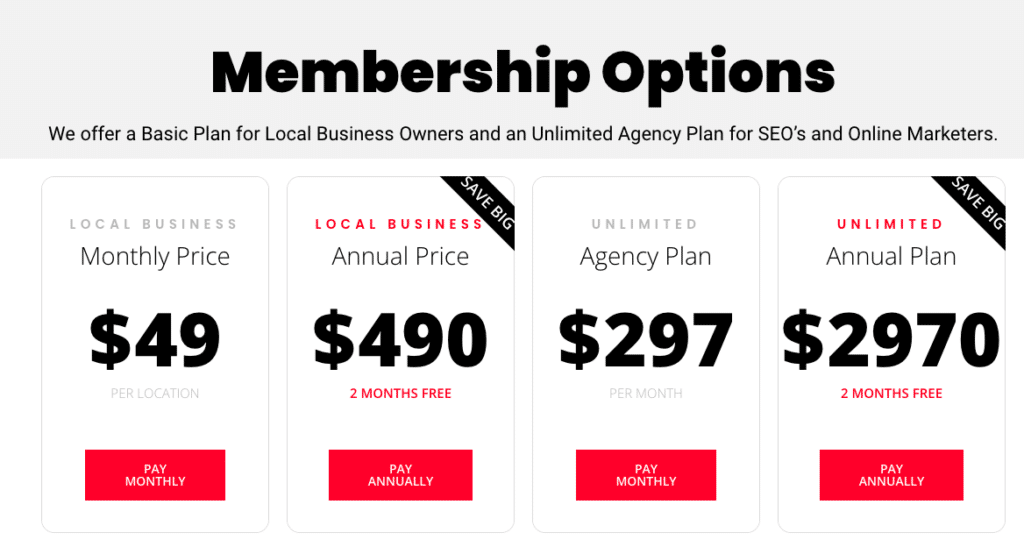Executing a Successful Local Business Listing

Get a 14-DAY FREE TRIAL for 300 Local Citations you can edit on one simple dashboard.
Local business listings play a crucial role in the success of small businesses. They help businesses gain visibility, attract local customers, and improve their online presence. However, executing a successful local business listing requires careful planning and implementation. In this article, we will explore the key steps and strategies to create an effective local business listing that drives results.
1. Understand the Importance of Local Business Listings
Before diving into the execution process, it’s essential to understand why local business listings are important for small businesses. Here are a few key reasons:
- Increased visibility: Local business listings help businesses appear in search engine results and online directories, making it easier for potential customers to find them.
- Improved online presence: Having accurate and consistent information across various online platforms builds trust and credibility among customers.
- Targeted marketing: Local business listings allow businesses to target specific geographic areas, ensuring that their marketing efforts reach the right audience.
- Positive customer reviews: Many local business listings platforms allow customers to leave reviews, which can significantly impact a business’s reputation and attract more customers.
Get a 14-DAY FREE TRIAL for 300 Local Citations you can edit on one simple dashboard.
2. Choose the Right Local Business Listings Platforms
Get your FREE 14 DAY TRIAL for over 300 local citations. Click below!

With numerous local business listings platforms available, it’s crucial to choose the ones that align with your business goals and target audience. Here are a few popular platforms to consider:
- Google My Business: As the most widely used search engine, Google My Business is a must-have for any local business. It allows businesses to manage their online presence, appear in Google Maps, and collect customer reviews.
- Yelp: Yelp is a popular platform for customer reviews and recommendations. It’s especially useful for businesses in the hospitality and service industries.
- Facebook: With billions of active users, Facebook provides an excellent platform for businesses to connect with their local audience and showcase their products or services.
- Yellow Pages: Despite the rise of digital platforms, Yellow Pages remains a trusted source for local business information. Listing your business here can help reach a broader audience.
While these platforms are a good starting point, it’s important to research and identify additional industry-specific or location-specific platforms that can further enhance your local business listing.
3. Optimize Your Business Information
Once you’ve chosen the platforms, it’s time to optimize your business information to maximize its impact. Here are some key elements to focus on:
- Business name: Ensure that your business name is accurate, consistent, and reflects your brand identity.
- Address: Provide your complete and accurate address, including street name, city, state, and zip code. This information is crucial for customers to find your physical location.
- Phone number: Include a phone number that customers can use to contact your business directly.
- Website URL: Add your website URL to drive traffic and provide customers with more information about your business.
- Business description: Craft a compelling and concise description that highlights your unique selling points and key offerings.
- Business category: Select the most relevant category that accurately represents your business.
Remember, consistency is key. Ensure that the information provided in your local business listings matches the information on your website and other online platforms.
Get a 14-DAY FREE TRIAL for 300 Local Citations you can edit on one simple dashboard.
4. Leverage Customer Reviews
Customer reviews can significantly impact a business’s reputation and influence potential customers. Encourage your satisfied customers to leave reviews on your local business listings platforms. Respond to both positive and negative reviews promptly and professionally to show that you value customer feedback.
According to a study by BrightLocal, 85% of consumers trust online reviews as much as personal recommendations. Positive reviews can help attract new customers and build trust in your business.
5. Monitor and Update Your Listings Regularly
Creating a local business listing is not a one-time task. It requires ongoing monitoring and updating to ensure accuracy and relevance. Here are a few key practices:
- Monitor customer reviews: Regularly check your local business listings for new reviews and respond promptly.
- Update business information: If your business undergoes any changes, such as a new address or phone number, update your listings accordingly to avoid confusion among customers.
- Stay active on social media: Engage with your audience on social media platforms linked to your local business listings. Regularly post updates, promotions, and relevant content to keep your audience engaged.
By regularly monitoring and updating your local business listings, you can ensure that your business information remains accurate and up-to-date, providing a positive experience for potential customers.
Get a 14-DAY FREE TRIAL for 300 Local Citations you can edit on one simple dashboard.
6. Consider Automation Services
Managing local business listings across multiple platforms can be time-consuming. Consider using automation services like Citation Vault to streamline the process. Citation Vault automates the creation of 300 local citations for any business, saving time and effort while ensuring accurate and consistent information across various platforms.
Automation services can help businesses scale their local business listings efforts and ensure that they are reaching a wider audience without the hassle of manual updates.
Get a 14-DAY FREE TRIAL for 300 Local Citations you can edit on one simple dashboard.
Executing a successful local business listing requires careful planning, optimization, and ongoing monitoring. By understanding the importance of local business listings, choosing the right platforms, optimizing your business information, leveraging customer reviews, and regularly updating your listings, you can maximize the impact of your local business listing efforts.
Remember to choose platforms that align with your business goals and target audience, optimize your business information for maximum impact, encourage customer reviews, and consider automation services like Citation Vault to streamline the process. With these strategies in place, your local business listing can become a powerful tool to attract local customers and boost your online presence.
So, take the first step today and start executing a successful local business listing to drive results for your small business.
Disclaimer: This article mentions Citation Vault, a local citation service that automates 300 local citations for any business.
Learn more about “Tips for setting up local business listing” right here.
Frequently asked questions about Executing a Successful Local Business Listing.

How Do I Optimize My Google My Business Listing for Local Search? 🤔
Hey there! 🙌 If you’re a local business owner, there’s no doubting how crucial a well-optimized Google My Business (GMB) listing can be for your success. A robust GMB profile can literally make or break your local SEO game. So how do you go about it? 🧐
First, make sure you claim your listing if you haven’t yet. Once claimed, start by filling in all the information as accurately as possible. This includes your business name, address, phone number, and website (NAPW) 📍.
The more complete your profile, the better Google can index it for relevant local searches.
Photos, photos, photos! 📸 Yes, you need them.
They give potential customers a sneak-peek into what they can expect. Include pictures of your storefront, interiors, staff, and products or services. High-quality images make your business look more reputable and attract more clicks.
Another pro tip is to use the Posts feature to keep your listing fresh and updated. 📝 Share offers, events, and news to engage with your audience. Google loves content that is current and adds value to the user.
Reviews are your best friend when it comes to local SEO. 😍 Ask your happy customers to leave positive reviews and make sure to respond to them. This not only builds trust but also sends signals to Google that you’re an engaged and customer-focused business.
Don’t forget to set your service areas and business hours. 🕒 Many people look for local businesses during specific times or in certain areas. So, if you have this information accurately listed, Google is more likely to recommend you.
In a nutshell, optimizing your GMB listing isn’t a one-time task. It needs continuous effort and regular updates. So roll up your sleeves and make your local business shine online! ✨
What Are the Best Practices for Using Keywords in Local Listings? 🔍
Hello Keyword Enthusiasts! 🎉 Keywords can be the magic wand that transforms your local business listing into a highly discoverable treasure chest. Here’s how you can sprinkle that keyword magic in your listing. ✨
Start with doing thorough keyword research 📚. Use tools like Google Keyword Planner to identify what terms your potential customers are using to search for businesses like yours. Once you’ve identified your keyword pool, it’s time to get tactical.
For starters, include your main keyword naturally in your business description. 📝 The description in your local business listing is an excellent place to tell both Google and your customers what you’re about.
Make sure to also use your keywords in the ‘Services’ and ‘Products’ sections if those are applicable for your business type. 🛒 This will help Google understand the specifics of what you offer and match your business to relevant local searches.
Geo-targeted keywords are a big win in local listings. 🌍
If you’re a florist in San Francisco, for instance, phrases like “San Francisco florist” or “flower shop in San Francisco” can help you rank high in local searches.
Lastly, use these keywords judiciously. 😇 Overstuffing your listing with keywords can not only make it read unnaturally but may also flag Google’s spam filters.
Keywords can be your ticket to the top of local search results, but only if used wisely and strategically. So start incorporating them and watch your local business gain traction! 🚀
How Important Are Reviews and How Do I Encourage Them? 🌟
Hey Review Warriors! 🌟 Customer reviews are more than just stars and text; they are social proof that can either elevate or sink your local business. Studies show that more than 80% of consumers read reviews before making a purchasing decision. 🛍️
First off, let’s talk about why reviews are essential. 📈 Positive reviews can not only boost your visibility in local search results but also encourage more clicks and drive traffic. They provide potential customers with a gauge on the quality of your service or product, essentially acting as an online word-of-mouth recommendation.
Encouraging reviews can be as simple as just asking for them. 😊 Request your customers to leave reviews through emails, or place a small sign in your store, or even ask them personally at the checkout. Make it easy by providing a direct link to your review platform.
Remember, authenticity is key! 🗝️ Fake reviews can lead to Google penalties and damage your reputation. Encourage honest reviews and take negative feedback as constructive criticism to improve your services.
Responding to reviews, both positive and negative, shows that you value customer feedback. 👍 It also gives you a chance to rectify any negative experiences, turning dissatisfied customers into loyal ones.
In conclusion, reviews are incredibly vital for the success of your local business. 🌟 By encouraging and managing them effectively, you’re setting your business on the path to local glory. 🏆
How Do I Monitor My Local Business Listing’s Performance? 📊
Hi Data Lovers! 🤓 Monitoring the performance of your local business listing is like taking its pulse; it lets you know if things are healthy or if immediate intervention is required. 🩺
The good news is Google My Business offers a variety of analytics right within its dashboard. 📈 Called Insights, this feature gives you a wealth of information ranging from how people found your listing to what actions they took after seeing it.
Some key metrics to keep an eye on include:
How many times your listing appeared in direct and discovery searches 🔍
Customer actions like visiting your website, calling you, or asking for directions 📍
The geographical areas where your customers are coming from 🌏
These metrics can help you tailor your future posts, offers, and even your products or services to meet the needs of your local audience better.
Regular monitoring will also help you understand the ROI of your local SEO efforts. 💰 Is your optimized listing bringing in more calls? Are more people asking for directions to your store? If the answer is yes, you’re on the right track.
Remember that data is only as good as the action you take based on it. 🎯 So make a habit of reviewing these analytics and tweaking your strategy accordingly.
To sum it up, don’t fly blind. Keep an eye on your metrics to understand how well your listing is performing and how it can be improved. 🚀
How Can I Beat My Local Competitors in Local Listings? 🥊
Hey Competitive Spirits! 🌟 Standing out in a crowded local market can be tough, but with the right strategies, you can top those local listings and be the star in your domain. 🌟
First, conduct a competitive analysis. 👀 Who are your main competitors? What are they doing right or wrong in their listings? Learn from their strengths and weaknesses.
Keywords again come into play here. Use geo-specific and long-tail keywords that your competitors might not be using. 🗝️ This can help you appear in local searches where your competition is lacking.
Leverage customer reviews like they are pure gold, because they are! 🌟 Encourage satisfied customers to share their experiences and always, always respond to reviews. This can make you look more engaging and responsive compared to your competition.
Another underutilized tactic is using Google Posts effectively. 📝 Share updates, offers, and news regularly to keep your listing fresh and engaging. Google likes up-to-date content, and this can give you a competitive edge.
Offering a Virtual Tour can also make you stand out. 🎥 It gives potential customers a 360-degree view of your business, increasing trust and engagement.
Remember, consistency is the key. 🗝️ Consistently monitoring your performance, updating your listing, engaging with your audience, and staying up-to-date with the latest SEO trends will keep you ahead of your local competitors.
To sum up, beating the competition requires a mix of smart SEO, effective customer engagement, and consistent monitoring. So go out there and conquer your local market! 🚀
There you have it! Your one-stop guide to executing a successful local business listing. Best of luck! 🍀
- Executing a Successful Local Business Listing
- local business listings
- local canadian citations
- local citations







